 |
 |
WorkShops |
| |
| Master Teacher Workshops |
| Workshops
and Guest Artists |
| |
|
|
|
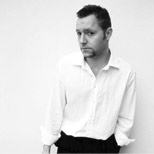 Fabrizio Paladin Fabrizio Paladin
Fabrizio Paladin is an award winning actor, playwright and musician who comes from the small town of Treviso, just outside Venice, Italy. With an expertise in Commedia dell Arte and improvisation, he holds a graduate degree from University of Bologna in Literature and Philosophy. He has worked with Aldo Sassi, Claudio Morganti, Luca de Fusco, and Commedia master Antonio Fava - a collaboration that took him as far as Honolulu and Tokyo. Fabrizio performs his original productions in Italy, and often tours throughout Europe and the United States.
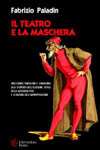 Fabrizio's book about Commedia, mask, and improvisation, Teatro E La Maschere, has just been published by FIRENZELIBR Fabrizio's book about Commedia, mask, and improvisation, Teatro E La Maschere, has just been published by FIRENZELIBR
|
JUST ANNOUNCED!!!!!!
Master teacher Fabrizio Paladin
returns to AMS for a 6-Day intensive workshop on the traditional art form
of Commedia dell'Arte!
August 5th - 10th
Tue-Fri Evenings, 6pm-9pm
Sat-Sun All Day, 9am-6pm
Price: $500
Fabrizio will walk you methodically through all of the necessary techniques and understandings needed to effectively and authentically perform Commedia and create your own performances. You will learn the history of Commedia, how to work effectively with the masks, the essential shape and movement of the classic Characters, like Arlecchino, Columbina, and Pantalone, the stock Canovaccio (plot outlines), Lazzi (stage gags), the secrets of good comic timing. You will also learn the techniques to create Canovaccio of you own.
Fabrizio’s workshops are physically intensive, immersing the students in the physical world of Commedia from day one. Each day of the workshop ends with the students presenting what they have developed to the class in the form of a “show.”
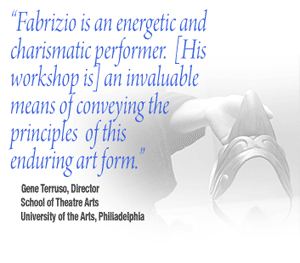
About Commedia dell’Arte: Commedia is the famous masked comic theatre tradition which originated with groups of travelling players in Renaissance Italy. Known for its classic stock characters and scenarios, improvisatory style, comic gags, it was also one of the only outlets for political satire of the day, and also provided the first opportunity for women to perform on stage. For actors, directors and teachers, Commedia dell'Arte is an invaluable skill, endowing performers with newfound control over their physical presence, adding clarity and power to their choices, freeing the improvisational spirit, and promoting listening and presence through ensemble collaboration. The influences of Commedia dell’Arte are felt even to this day and can be seen in the work of our greatest comedians on television, film, and theater, from Chaplin to Seinfeld, Buster Keaton to Jack Black and Jim Carey. Don’t miss this second chance in 2008 to work with master Fabrizio Paladin! |
|
Michael Chekhov for the Actor
 “The
essence of our profession… is to give. What is it that we in the
theater give? … We give our body, voice, feelings, will, imagination – we
give a form of pulsating art to life itself; we give it to our characters and
we give it to our audiences. Nothing, absolutely nothing remains for us save
the pleasure of having given pleasure. And yet it is only by this miraculous
process that our love grows and our talent is fulfilled
and replenished.”— Michael
Chekhov “The
essence of our profession… is to give. What is it that we in the
theater give? … We give our body, voice, feelings, will, imagination – we
give a form of pulsating art to life itself; we give it to our characters and
we give it to our audiences. Nothing, absolutely nothing remains for us save
the pleasure of having given pleasure. And yet it is only by this miraculous
process that our love grows and our talent is fulfilled
and replenished.”— Michael
Chekhov
Michael Chekhov for the Actor
Classes is Chekhov Technique of Acting

8 Week Intensive
Michael Chekhov Technique for
actors:
Chekhov on Chekhov ©
Anton and Michael
The text: The Three sisters
Application of: Michael Chekhov Technique
click
here for class schedule
Cost: $300.00
Early Registration discount $50.00
This class will explore Michael Chekhov’s "psycho-physical" approach
to acting, through the basic principles and exercises outlined in Chekhov’s
book “To the Actor”, including psycho/physical exercises,
character work and ensemble improvisation. Each class begins
with a warm-up specifically designed to develop the organic connection between
the actor's inner life, creative imagination and expressive body. Through the
rigorous practice of Chekhov’s core exercises students will explore; Radiating
and Receiving, Archetypes, Imaginary Centers,
Imaginary body, Character Atmospheres, Overall scenic Atmospheres, Qualities
of Movement, Imaginary Palace, and Psychological Gesture, along with on camera
adjustments and
more… Chekhov's technique consists of a wide variety effective acting
tools, which can inspire endless possibilities for enlarging the actor's creativity
and artistic expression - the actor can then bring this sensibility to the creation
of a character, exploration of the text, and inspired performance.
Quotes from his Students:
“Michael Chekhov brings to the actor a far greater
insight into himself and his character. He enables the actor to approach any
role with new skill and ease. ” ~ Gregory Peck
“ As Michael's pupil, I learned more than acting...
Every time he spoke, the world seemed to become bigger and more exciting. . .
. Acting became important . . . an art that increased your life and mind.
Acting became more than a profession to me. It became sort of a religion.” ~
Marilyn Monroe
 Michael
Chekhov (1891 - 1955) was the nephew of the playwright Anton
Chekhov and was widely recognized as one of the greatest actors of the 20th century.
He was considered by Stanislavsky to be his most brilliant student. Indeed, Stanislavsky
once said that if anyone wanted to know what he was teaching, they should go
and see what Michael Chekhov was doing. Chekhov had a great talent for characterization
and was a keen observer of the creative process. At the Moscow Art Theatre, the
collaboration between Stanislavsky, Vachtangov, Meyerhold and Michael Chekhov
led to a theater that was bold, expressive and imaginative. In their work they
searched for objective principles that would lead to inspired acting. This investigation
led Michael Chekhov to develop his psycho - physical acting technique, incorporating
imagination and body. Chekhov was warned to leave
Russia in 1928 at the height of his acting and directing career; his productions
were too experimental for the Soviets and were labeled "alien and reactionary." He
then spent eight years in Europe, acting, directing, and teaching, but was greatly
handicapped by language, political factions, and the threat of war. In 1936,
Beatrice Straight invited him to establish the Chekhov Theatre Studio, a training
program for a company of actors at Dartington Hall in England. In 1939, the threat
of war with Germany caused the group to relocate to Ridgefield, Connecticut until
it was forced to disband because it lost its male members to the draft. 1942
Michael Chekhov was invited to Hollywood, where he became an acting
coach to the stars, acted in many films, published his book, "To
the Actor," and taught a group called The Drama Society. Prominent actors
in Hollywood who studied with him were: Gary
Cooper, Marilyn Monroe, Gregory Peck, Patricia Neal, Clint Eastwood, Anthony
Quinn, Ingrid Bergman, Jack Palance, Lloyd Bridges, and Yul Brynner (who
wrote the preface to Chekhov's "To the Actor.") Michael Chekhov died in Hollywood,
California in 1955, before his work became widely known. Michael
Chekhov (1891 - 1955) was the nephew of the playwright Anton
Chekhov and was widely recognized as one of the greatest actors of the 20th century.
He was considered by Stanislavsky to be his most brilliant student. Indeed, Stanislavsky
once said that if anyone wanted to know what he was teaching, they should go
and see what Michael Chekhov was doing. Chekhov had a great talent for characterization
and was a keen observer of the creative process. At the Moscow Art Theatre, the
collaboration between Stanislavsky, Vachtangov, Meyerhold and Michael Chekhov
led to a theater that was bold, expressive and imaginative. In their work they
searched for objective principles that would lead to inspired acting. This investigation
led Michael Chekhov to develop his psycho - physical acting technique, incorporating
imagination and body. Chekhov was warned to leave
Russia in 1928 at the height of his acting and directing career; his productions
were too experimental for the Soviets and were labeled "alien and reactionary." He
then spent eight years in Europe, acting, directing, and teaching, but was greatly
handicapped by language, political factions, and the threat of war. In 1936,
Beatrice Straight invited him to establish the Chekhov Theatre Studio, a training
program for a company of actors at Dartington Hall in England. In 1939, the threat
of war with Germany caused the group to relocate to Ridgefield, Connecticut until
it was forced to disband because it lost its male members to the draft. 1942
Michael Chekhov was invited to Hollywood, where he became an acting
coach to the stars, acted in many films, published his book, "To
the Actor," and taught a group called The Drama Society. Prominent actors
in Hollywood who studied with him were: Gary
Cooper, Marilyn Monroe, Gregory Peck, Patricia Neal, Clint Eastwood, Anthony
Quinn, Ingrid Bergman, Jack Palance, Lloyd Bridges, and Yul Brynner (who
wrote the preface to Chekhov's "To the Actor.") Michael Chekhov died in Hollywood,
California in 1955, before his work became widely known.
|
Catherine
Fitzmaurice Technique
Voice
Labs with Ilse
Pfeifer
Summer Institute
Fall Workshops TBA

Visiting,
Guest Artist Catherine Fitzmaurice
Fitzmaurice Voicework is a comprehensive approach to voice
training that can include, as needed, work on breathing, resonance, speech, dialects,
impromptu speaking, text, singing, and voice with movement. While the training
is specific, it is also compatible with other approaches.
MAIN
FEATURES:
Physicality: we develop
awareness of patterns of vocal effort through a series of gentle and/or rigorous
exercises, accessing the body's own healing systems for deep release.
Breath: we explore the central role that breathing plays in both voice production
and the imagination, encouraging whole body oxygenation without forcing the breath.
Vocal Quality: we cultivate the ability to accurately
communicate our thoughts and feelings while meeting the demands of text, space,
and the immediate moment, through both spontaneity and choice.
Practical Results: we reduce strain in the voice, increase
vocal range and expressivity, make speech easy and clear, and communicate intention
more effectively, allowing creativity to flow.
Vocal Rehabilitation: we can help to resolve many functional
vocal difficulties.
BIO:
Ilse Pfeifer
is
Associate Teacher of Fitzmaurice Voicework and has taught at the Actors Center,
Gate Acting Conservatory, NYU Playwrights Horizons and as guest teacher at Eastern
Connecticut State University, Fordham University, Eastern New Mexico University,
University of New Mexico and Sioux Falls University. She has taught in Germany
at the Freie Universitaet Berlin and Berlin School of Performing Arts. Ilse holds
graduate diplomas from the Royal Academy of Dancing and the Imperial Society
of Teachers of Dancing in London. She received honors as a Pew Fellowship in
the Arts Discipline Winner in Choreography and Dance - based Performing Art.
Her work has been presented by Lincoln Center out - of - Doors Festival and PS
122 in NYC and Next Move Festival at Center, American Music Theater Festival,
Movement Theater International, City Dances and PBS in Philadelphia.
BIO:
Catherine Fitzmaurice
teaches voice and text to private clients in New York City,
as well as around the United States and internationally. She has taught voice
and text at Yale School of Drama, Harvard/A.R.T., the Juilliard School, NYU's
Graduate Acting program, ACT, UCLA, USC, New York's Actors Center, London University,
the Central School of Speech and Drama, in workshops and seminars, and in theatre
and medical conference presentations for voice professionals. She is Professor
of Theatre at the University of Delaware, where she teaches acting to undergraduates.
Catherine's article, "Breathing
is Meaning," describing the origins and methods of her approach to voice training,
is published by Applause Books in THE VOCAL VISION, ed. Marian Hampton, New York,
1997; her article, "Zeami
Breathing," is published in the Internet Journal, "Consciousness, Literature,
and the Arts," Vol. 1, #1, March 2000, and in "The Voice and Speech Review," Vol.
#1, August 2000; and her article, "Structured
Breathing," is published in the VASTA Newsletter, Spring 2003,Vol. 17, #1.
|
|
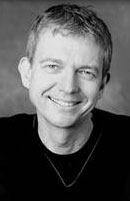 One
night with World Acclaimed Master Teacher One
night with World Acclaimed Master Teacher
Andrew
Wade
Verse Consultant on the film “SHAKESPEARE IN LOVE” and
Kenneth Branagh’s Hamlet
Summer Institute Facilty
To Register: ams@actorsmovementstudio.com
Voice and Classical Text “Shakespeare”
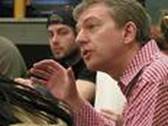 Andrew Wade was Head of Voice at the Royal Shakespeare Company from 1990
- 2003.He joined the Royal Shakespeare Company in 1987 as Assistant
Voice Director to Cicely Berry. When he took over the Department his
responsibilities involved overseeing all the voice work for the RST, Swan and
TOP and for all touring, residences and up until the Company leaving the Barbican
in 2001, the work in London as well. He co-directed and devised with Cicely Berry
Journey's, Words, Words, Words, More Words and Lifespan - a poetry and prose
collection collated into a theatrical program, being commissioned by the BBC
World Service and winning a Bronze Medal at the International Radio Festival
in New York in 2000.Andrew has a particular interest in exploring language practically,
which he fulfills by working with youngsters, students, teachers and academics.
Andrew has traveled widely, lecturing, leading Master Classes and Workshops,
as well as coaching with theatre companies and actors abroad - Australia, Belgium,
Colombia, Canada, Denmark, France, Germany, Greece, India, Ireland, Japan, The
Netherlands, New Zealand, Norway, Poland, Russia, South Africa, Sweden, Singapore,
Switzerland and extensively in the United States of America. He has published
several articles on his work. In conjunction with Cicely Berry, they have recorded
WORKING HAKESPEARE, a series on voice and text work with Helen Hunt, Samuel L
Jackson, Toby Stevens, Clare Danes, Blythe Danner, Emily Watson and introduced
by Jeremy Irons. He is currently working with Source Books on SHAKESPEARE EXPERIENCE,
editions of Shakespearean recordings, plus audio excerpts with contemporary actors,
currently As You Like It, Julius Caesar, Macbeth and Romeo & Juliet. Andrew
trained at the Rose Bruford College of Speech and Drama from 1973-1976. He has
worked in many different drama schools including Mountview Theatre School, the
Rose Bruford College, the Arts Educational School and was Head of Voice at East
15.Andrew was Verse Consultant on the film SHAKESPEARE IN LOVE. He also coached
Courtney Love for the role of Lady Macbeth, which is currently in the making.
Andrew has just returned from Toronto after working on the new musical LORD
OF THE RINGS Andrew Wade was Head of Voice at the Royal Shakespeare Company from 1990
- 2003.He joined the Royal Shakespeare Company in 1987 as Assistant
Voice Director to Cicely Berry. When he took over the Department his
responsibilities involved overseeing all the voice work for the RST, Swan and
TOP and for all touring, residences and up until the Company leaving the Barbican
in 2001, the work in London as well. He co-directed and devised with Cicely Berry
Journey's, Words, Words, Words, More Words and Lifespan - a poetry and prose
collection collated into a theatrical program, being commissioned by the BBC
World Service and winning a Bronze Medal at the International Radio Festival
in New York in 2000.Andrew has a particular interest in exploring language practically,
which he fulfills by working with youngsters, students, teachers and academics.
Andrew has traveled widely, lecturing, leading Master Classes and Workshops,
as well as coaching with theatre companies and actors abroad - Australia, Belgium,
Colombia, Canada, Denmark, France, Germany, Greece, India, Ireland, Japan, The
Netherlands, New Zealand, Norway, Poland, Russia, South Africa, Sweden, Singapore,
Switzerland and extensively in the United States of America. He has published
several articles on his work. In conjunction with Cicely Berry, they have recorded
WORKING HAKESPEARE, a series on voice and text work with Helen Hunt, Samuel L
Jackson, Toby Stevens, Clare Danes, Blythe Danner, Emily Watson and introduced
by Jeremy Irons. He is currently working with Source Books on SHAKESPEARE EXPERIENCE,
editions of Shakespearean recordings, plus audio excerpts with contemporary actors,
currently As You Like It, Julius Caesar, Macbeth and Romeo & Juliet. Andrew
trained at the Rose Bruford College of Speech and Drama from 1973-1976. He has
worked in many different drama schools including Mountview Theatre School, the
Rose Bruford College, the Arts Educational School and was Head of Voice at East
15.Andrew was Verse Consultant on the film SHAKESPEARE IN LOVE. He also coached
Courtney Love for the role of Lady Macbeth, which is currently in the making.
Andrew has just returned from Toronto after working on the new musical LORD
OF THE RINGS
|
|
|
Lecoq
Workshop A Technique for an “Actor-Centered Theatre”
Master Teachers TBA
 Jacques
Lecoq believed in movement-based training for actors that would equip them to
be playful, spontaneous and creative. His training also holds that the generation
of ensemble is crucial to a working process that is collaborative. His emphasis
is on the actor-as creator rather than an interpreter of text. Lecoq work is
somatic and openly connected to the spectator. It is through this visceral connection
that events occur that can only happen in the medium of live theatre. This workshop
will focus on “actor-centered theatre” – with the actor-as-creator
and collaborator; by practicing the exercises and group explorations somatically;
and, finally, by maintaining an open and direct relationship with the audience. Jacques
Lecoq believed in movement-based training for actors that would equip them to
be playful, spontaneous and creative. His training also holds that the generation
of ensemble is crucial to a working process that is collaborative. His emphasis
is on the actor-as creator rather than an interpreter of text. Lecoq work is
somatic and openly connected to the spectator. It is through this visceral connection
that events occur that can only happen in the medium of live theatre. This workshop
will focus on “actor-centered theatre” – with the actor-as-creator
and collaborator; by practicing the exercises and group explorations somatically;
and, finally, by maintaining an open and direct relationship with the audience.
Solo exercises and small group work include:
- Exploration into the 4 principle elements – water,
fire, wind and earth with use of the neutral mask.
- Neutral mask encounters with unlikely elements.
- “Gestural Language”, silent
and vocal, including figurative or transformational mime.
- “Profound Mimage” in connection
with the genre, style and text of the summer intensive: for example, finding
the inner gestures of primary Edwardian characters.
|
|
|
 MASTER
MASK CLASS MASTER
MASK CLASS
Taught
by Master Teacher
Shelley Wyant
Summer Institute Faculty
Workshop
Mask
Class Curriculum
T H E N E U T R A L M A S K
PART
ONE
Exploring
Transformation
• Transformation
Exercise: A comprehensive hands-on introduction into the world of the mask.
• Explore
the Room: Further discoveries using the freedom provided in the mask world.
• Chairs:
Integration of the full body and the mask.
  PART
TWO PART
TWO
The
Four Stages of Man
• Toddler.
Adolescent, Adult, Elderly
• Scales
PART
THREE
Hinge
Moments
Using the breath and focus finding the elements that allow the body to speak.
Choreography of grand moments of change from Shakespeare, Mythology, The Bible
and Fairy Tales.
C H A R A C T E R M A S K
PART
FOUR
(pre-requisite,
two of preceding three sections)
This section utilizes the 3/4 or half mask with the actor's own mouth exposed.
With the return of the voice, a vast array of characters that populate the classroom.
Actor muscles flex and develop.
Shelley
Wyant
Founding Artistic Director of internationally
acclaimed mask & puppet performance company Mask Work Unlimited, Shelley
has taught classes and workshops for NYU, Yale, Circle in the Square, Smith,
Brown, Stella Adler Conservatory, The Actors Studio MFA Program, and Bard College,
among many others. She worked with Jacques LeCoq, studied in Bali with Idi Bagnus
Anom, and apprenticed for years to Pierre LeFevre of The Juilliard School. Shelley’s
recent directing and coaching credits include shows for Berkshire Theatre Festival,
The Edinburgh Fringe Festival, and Terrence McNally’s A PERFECT GANESH
at Manhattan Theatre Club |
|
Movement
MARATHONS
 Mind –Body- Voice Connection Mind –Body- Voice Connection
A
Psychophysical approach to Acting
Viewpoints & Composition
Michael Chekhov Technique
Williamson Technique
Click here for class schedule
Cost $300
8 weeks
Early Registration Discount 50.00
 • 9 viewpoints
• Atmospheres
• Quality of Movement
• Kinesthetic Awareness
• Sensation
• Imagination
|
|
MIME
and PANTOMIME
BILL
BOWERS
Summer Intensive Faculty
Tools
for the Actor
 Mime
and Pantomime with BILL BOWERS offers an introduction to these art forms; include
a brief history of Mime, physical warm-up, and movement improvisation. Participants
will learn illusory skills, and have the opportunity to incorporate mime technique
into their acting work. Ideally students will begin to gain an awareness of how
pantomimic skill and corporeal style enhance and impact actor training. This
workshop is open to all, movers and non movers. Mime
and Pantomime with BILL BOWERS offers an introduction to these art forms; include
a brief history of Mime, physical warm-up, and movement improvisation. Participants
will learn illusory skills, and have the opportunity to incorporate mime technique
into their acting work. Ideally students will begin to gain an awareness of how
pantomimic skill and corporeal style enhance and impact actor training. This
workshop is open to all, movers and non movers.
Please dress comfortably
and be prepared to move.
BILL
BOWERS
He presently teaches at New York University, and is a teaching
artist for the PaperMill Playhouse, Urban Stages, and the Institute for Arts
and Humanities Education. He regularly presents workshops and master classes,
and has studied with the legendary Marcel Marceau
As an actor, mime and educator, Bill Bowers has traveled throughout the United
States. His original mime shows, ' NIGHT SWEETHEART 'NIGHT BUTTERCUP and UNDER
A MONTANA MOON have been produced Off Broadway to critical raves.
Margo
Jefferson of the The NEW YORK TIMES writes:
"To watch Bill Bowers was to see the technical elements
of a style that brings Marcel Marceau readily to mind, joined to the American
West. Mime can be wonderful - the air between him and us was his palette."
His Broadway credits include Zazu in THE LION KING, and Leggett in THE SCARLET
PIMPERNEL. He has also appeared in New York at Ensemble Studio Theater, Here,
LA MA MA, St. Anne's Warehouse, and the NY Fringe Festival. Bill's regional credits
include Berkshire Theater Festival, Cincinnati Playhouse, Rep of St. Louis, Northshore
Music Theater, Two River Theater, Arkansas Rep,George Street Playhouse, Montana
Rep, PaperMill Playhouse, the Denver Center, Tennessee Rep, Seven Angels Theater,
and the Eugene O'Neill Center.
Bill holds an MFA from Rutgers University's Mason Gross School of the Arts, and
an Honorary PhD from his alma mater, Rocky Mountain College.
|
|
| |
|
 |
|
| |
|
|